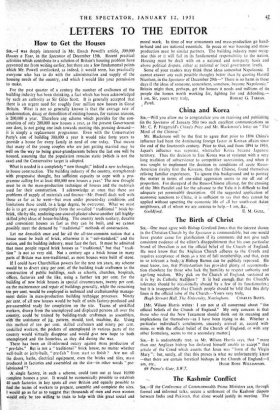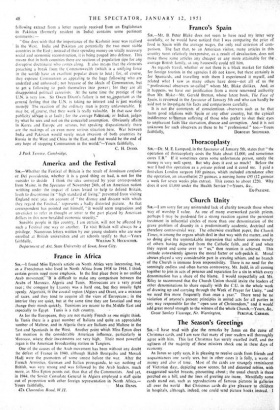The Kashmir Conflict
SIR.—If the Conference of Commonwealth Prime Ministers can, through' formal and informal talks, secure a settlement of the Kashmir dispute between India and Pakistan, that alone would justify its meeting. The
following extract from a letter recently received from an Englishman in Pakistan (formerly resident in India) contains some pertinent comments:— "One does wish that the importance of the Kashmir issue was realised in the West. India and Pakistan are potentially the two most stable countries in the East ; instead of their spending money on vitally necessary social and economic reconstruction, it is being pawed into defence. This means that in both countries there are sections of population ripe for any disruptive doctrinaire who comes along. It also means that the elements preaching a break from the Commonwealth (which is a unifying force in the world) have an excellent popular drum to beat ; for, of course, they espouse Communism as appealing to the huge following who are underfed and unhoused ; not because of the ideals of Communism, but to get a following to push themselves into power ; for they are all disappointed political careerists. At the same time the prestige of the U.N. is very low. Sir Owen Dixon's failure is not sopiportant as the genera4 feeling that the U.N. is taking no interest and is just wasting mom), The reaction of the ordinary man is pretty unfavourable. It may be, occourse, that their work is really valuable. In that case their publicity serve is at fault ; for the average Pakistani, or Indian, judges by what he sees and not on the concealed assumption. Obviously affairs In Korea and Europe Are serious, but speaking dispassionately there are the makings of an even more serious situation here. War between India and Pakistan would surely mean invasion of both countries by Russia in the West and China in the East, and that would be the end of any hope of stopping Communism in the world."—Yours faithfully,



































 Previous page
Previous page